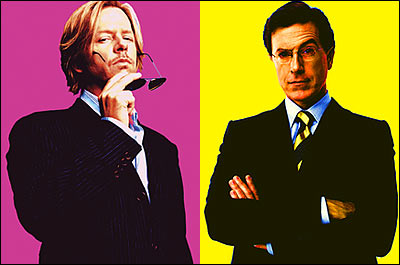
David Spade’s had a career so bad—the terrible movies (Joe Dirt), the dismal sitcom (Just Shoot Me), the grating Capital One commercials—that even David Spade makes fun of it. Stephen Colbert, by contrast, is coming off eight great years as The Daily Show’s arch-foil to bemused host Jon Stewart. Both Spade and Colbert are hosting new shows on Comedy Central, one of which debuted to resounding fanfare while the other skulked onto the schedule like a drunk teenager sneaking home after curfew. Both shows are, thus far, intermittently entertaining yet problematic—but one has problems so intrinsic as to be potentially unfixable. And it’s not the one hosted by David Spade.
True, Spade’s developed a persona over the years that’s so unctuous you want to whack him with a shoe. But as a whippersnapper on Saturday Night Live way back in the early nineties, he concocted the hilarious—and prescient—segment called “Hollywood Minute,” which featured takedowns of celebrities, delivered with the precision of poisoned darts. The best of these—as when, with a photo of M.C. Hammer behind him, Spade sang the famous riff from “Can’t Touch This,” ending with an abrupt “It’s over,” then moved coolly on to the next joke—were crafted around a fresh (and correct) assumption: that his audience was just as conversant, transfixed, and fed up with pop-culture vacuity as he was.
Spade’s The Showbiz Show could easily be called The Hollywood 22 Minutes, delivering updated jabs. (On the Black Eyed Peas, the overexposed, endorsement-friendly rap group behind the hit “Let’s Get It Started”: “Here’s an idea. Let’s get it stopped.”) The show’s greatest drawback, in fact, is Spade’s own influence: There are now a thousand TV comedians and a million Websites that toss off dismissive one-liners, so Spade’s snide voice is just one in a deafening din. He seems to sense this, at times becoming laconic to the point of coma—as though he can’t quite muster the energy to take another swipe at Paris Hilton. He should snap out of it and sit up straight. Other people might be carpet-bombing celebrity absurdity, but he’s still got the best delivery system for laser-targeted strikes.
Stephen Colbert is just as adept with his own trademark shtick—and that’s the dilemma of The Colbert Report. (It’s pronounced “Colbare Repore,” a joke that wears thin after about ten minutes.) Whereas The Daily Show offers the wisecracking, eye-rubbing Jon Stewart as our proxy—he makes the jokes about current events we wish we were smart enough to think of—Colbert plays a character: a noxious, self-regarding pundit, clearly modeled on Bill O’Reilly. It’s an astute parody, but it suffocates the show, sealing The Colbert Report under a hermetic layer of irony. Rather than Stewart looking at the world and saying, “What the !@#$@?,” you’ve got Colbert saying, “Isn’t this great, America!,” but with an arched eyebrow, to imply that what he really means is “What the !@#$@?”
As a result, The Colbert Report offers a few Daily Show–quality laughs (like a brisk segment titled “All You Need to Know,” which, ironically, delivers Spade-style smackdowns on current trends), but none of The Daily Show’s catharsis. Daily Show acolytes love that show because they believe it’s the one news source that tells it like it is. The Colbert Report, by contrast, is a narrowly focused yet maddeningly convoluted lampoon: It skewers the ways in which other news shows don’t tell it like it is. In other words, it feels like something cooked up by smart people whose day job involves watching sixteen hours of cable news: i.e., writers for The Daily Show.
Of these two debuts, it’s a shock that Colbert’s should be the one that’s wobbly—until you analyze the problem. The Daily Show’s brain trust has never had a shortage of intelligence. But with The Colbert Report’s gag-within-a-gag-within-a-gag, they may have outsmarted themselves.

One great reason for giving Stephen Colbert his own show? So he won’t leave the stable altogether. Recently, Steve Carell—Colbert’s old sparring partner in the hilarious segment “Even Stev/phen”—became the first Daily Show alumnus to achieve Will Ferrell–ish fame. Others—Mo Rocca, Rachel Harris—have been less successful in finding projects suited to their talents. The most disgruntled defector, though, might be the man Jon Stewart replaced: Craig Kilborn, whose subsequent talk show withered while The Daily Show bloomed.
The Showbiz Show
Comedy Central.
Thursdays, 10:30 p.m.
The Colbert Report
Comedy Central.
Monday through thursday, 11:30 p.m.